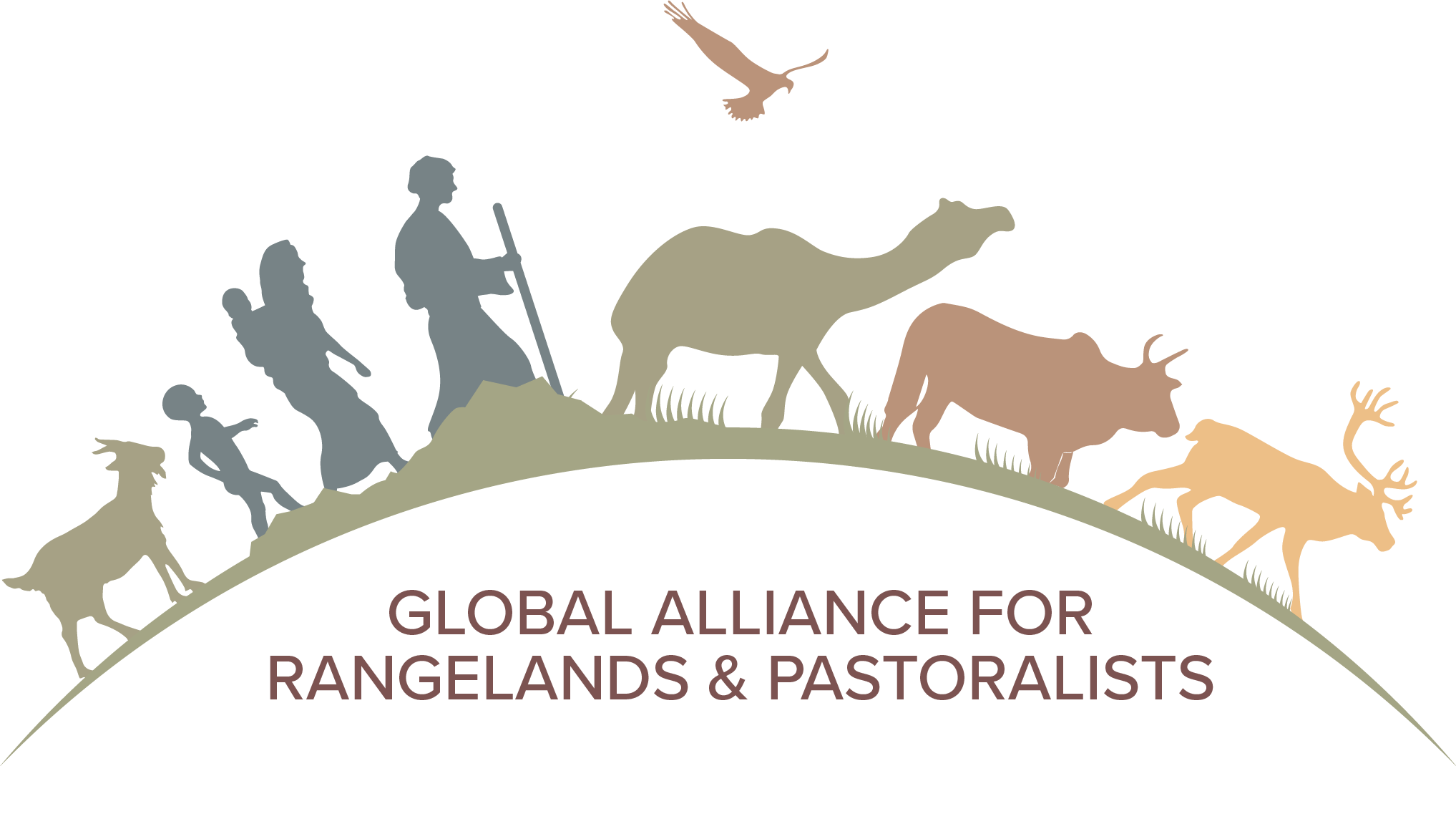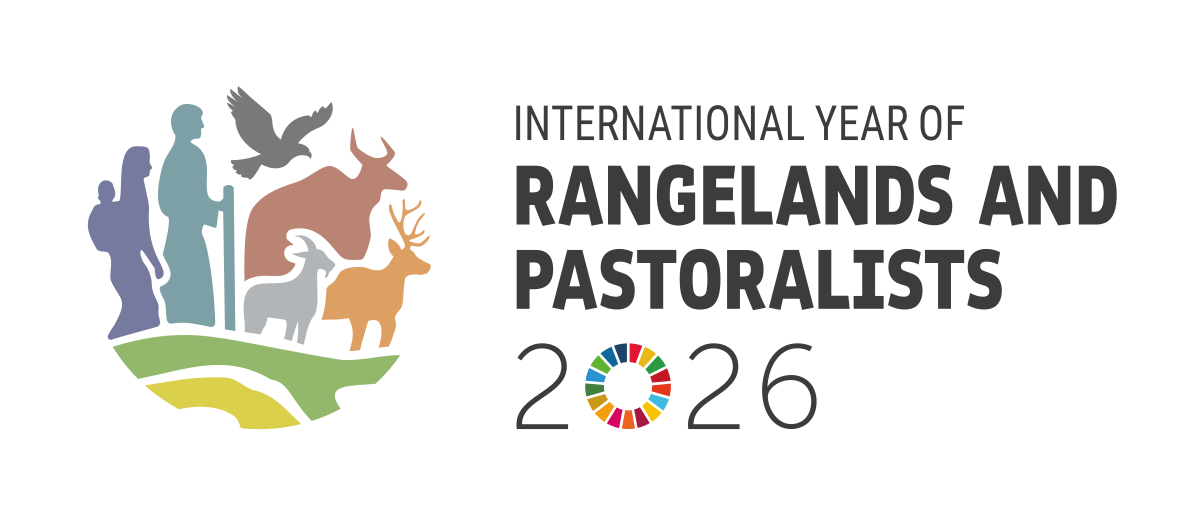For the International Grassland Congress (IGC) 2023 in Covington, Kentucky
Greetings to the IGC 2023 from the International Year of Rangelands & Pastoralists (IYRP) coalition!
The International Grassland Congress (IGC) is a part of the IYRP coalition (www.iyrp.info/friends-of-iyrp), as is fitting, seeing as about 60% of global rangelands are grasslands (see www.rangelandsdata.org/atlas). For the IGC 2023, we offer information and an update on the IYRP coalition, its activities and future plans. We invite your organisation to join the IYRP coalition (contact iyrp@iyrp.info) and become a Friend of IYRP.
eUnited Nations declare IYRP in 2026
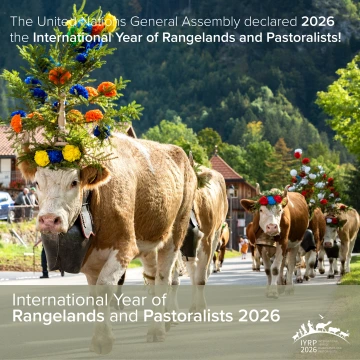
In August 2019, the Government of Mongolia – a traditionally pastoralist country – proposed that the United Nations (UN) declare an International Year of Rangelands and Pastoralists (IYRP). The UN designates specific years as times to highlight a particular topic of importance to the UN’s objectives.
In March 2022, the UN General Assembly (UNGA) adopted unanimously the resolution initiated by Mongolia and supported by 60 Member States representing all regions of the world. The UN’s declaration of 2026 as the IYRP reflects the importance of rangelands in creating a sustainable planet and supporting economic growth and resilient livelihoods for pastoralist communities around the world.
The UN invited the Food and Agriculture Organization (FAO) to serve as the lead agency in implementing the IYRP in 2026, but already now, the IYRP coalition is actively involved in preparing for the IYRP.
Why an IYRP?
- To increase worldwide understanding of the value of rangelands and pastoralism for food security, economy, environment and cultural heritage
- To fill knowledge gaps about rangelands and pastoralists through participatory research and strategic communication
- To promote informed, science-based policy and legislation for current and future generations
- To advocate for strengthening the capacity of the pastoralism sector and for increasing responsible investment in sustainable land-use practices, equitable access to markets, and the health and wellbeing of people and animals in the rangelands as a climate solution.
Short films on rangelands & pastoralists
See the IYRP opening film on www.iyrp.info and the animated video Pastoralism is the future (www.youtube.com/watch?v=DeqITzac9Ac&t=6s)
More films on the global and 11 regional pages of the IYRP website and on the website of the
Perspectives on Pastoralism Film Festival (www.pastoralistfilmfestival.com)
What are rangelands? Who are pastoralists?
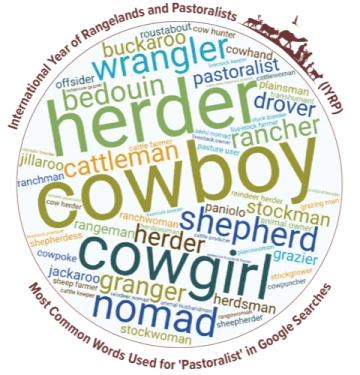
“Rangelands” are areas where the indigenous vegetation comprises predominantly grasses, grass-like plants, forbs or shrubs that are suitable for grazing by livestock and wildlife. Rangelands include native grasslands, savannas, shrublands, deserts, steppes, tundra, alpine vegetation and marshes – see more names in the word cloud.
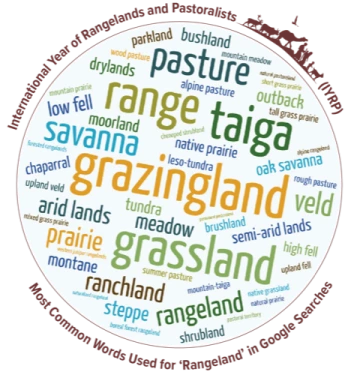
“Pastoralists” are people who – as their primary source of living – raise domesticated or semi-domesticated animals that graze predominantly on natural vegetation on rangelands. Livestock mobility is a key strategy to manage pastoral livestock, but the pastoralists may be sedentary, e.g. ranchers. Pastoralists identify themselves with a myriad of names – see the word cloud for only some of the English terms.
Some quotes from the IYRP website (www.iyrp.info)
The IYRP will encourage more countries to enhance awareness and knowledge on sustainability of rangelands and pastoralists, support the livelihoods and food security of millions of people, boost efforts for investment in pastoral systems and restoration of degraded rangelands, and accelerate implementation of the SDGs.
– H.E. Mr Enkhbold Vorshilov, Ambassador & Permanent Representative of Mongolia to the UN
By working with nature, sustainable pastoralism offers innovative solutions to address a multitude of global challenges … FAO will engage in setting up a mechanism to interact with pastoralism and rangelands.
– Marie Helena Semedo, FAO Deputy Director General
Because pastoralists live in these challenging and ever-changing environments and have adapted to many past changes, their traditional knowledge may hold the key to how to live in an uncertain future.
– Maria Fernández-Giménez, Professor, Colorado State University
We want our products to be paid for their real value so we can have better income and provide wellbeing for our families.
– Higinio Porto, Vice-President, Pastoraméricas, Peru
We need this International Year of Rangelands & Pastoralists to help restore living in harmony between people and nature.
– Hindou Oumarou Ibrahim, Coordinator of Association of Indigenous Women and Peoples of Chad
Structure of the IYRP 2026 coalition
The IYRP 2026 coalition consists of an International Support Group (ISG) with members from around the world, collaborating in Regional IYRP Support Groups (RISGs) and thematic working groups, coordinated by a multi-stakeholder Global Coordinating Group (GCG). Information is shared primarily through the IYRP website and an IYRP listserv. To join this listserv, contact iyrp@iyrp.info
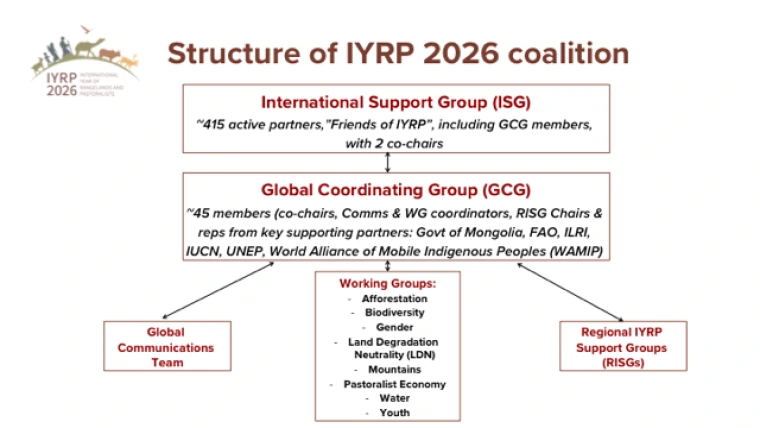
What does the IYRP initiative seek to achieve by 2026 and beyond?
- Greater awareness in spheres of government, science and society about how rangelands and pastoralists contribute to food security, economy, environment, cultural heritage & social wellbeing
- Resolutions taken by UN and other international entities in support of healthy rangelands and resilient pastoralists and global rangeland stewardship
- Changes in subnational, national, regional and global policies in favour of sustainable management and conservation of rangeland resources by pastoralists and other stakeholders
- Increased sustainable and ethical investment in rangeland management and pastoralist livelihoods
Some activities planned to achieve this
- Engaging in collaborative and participatory research and publishing science reviews
- Formulating and sharing policy briefs and advocacy statements
- Organising pastoralist gatherings
- Conducting social media campaigns
- Launching film festivals and travelling photo exhibits
- Hosting pastoralist innovation fairs
- Arranging sessions and side events at international conferences
- Holding conferences and webinars
Regional IYRP Support Groups (RISGs)
Multi-stakeholder RISGs have formed in 11 regions around the world to generate partnerships. They seek to expand the network of supporting individuals, organisations and governments and to work with the ISG in planning and implementing IYRP activities in these regions and in countries within them. Several of the RISGs are co-chaired by representatives from pastoralist organisations.
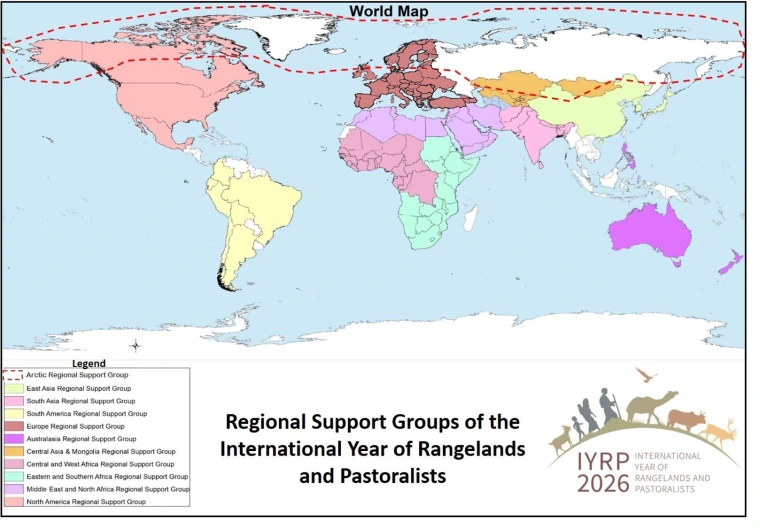
Contact details for the RISG coordinators can be found here: www.iyrp.info/resources/front
Short reports on the work of the RISGs can be found in the IYRP updates: www.iyrp.info/resources/news
Selected highlights of the work of the RISGs
Arctic: Launch in Feb 2023 of Global Environment Fund project on Reindeer Herding & Resilience to develop new international management of landscapes and pastures in the Arctic Region, a cooperation of World Reindeer Herders and International Centre for Reindeer Husbandry.
Australasia: Preparing the XIIth International Rangeland Congress in Adelaide on 2–6 June 2025 to provide vibrant platform for scientific exchange and education on contemporary challenges and opportunities facing rangelands, pastoralists and associated rural communities – an important scene-setting & networking event leading to IYRP 2026.
Central Asia & Mongolia: Camel Heritage Festival 2023 organised with Mongolian Ministry of Food, Agriculture & Light Industry for sustainable rangeland use, increased pastoralist incomes and maintained pastoralist heritage; promoted culture of Gobi camel herders and allowed sharing among herders, local communities and administrations.
East Asia: At the Chinese Grassland Society’s annual meeting in April 2023 in Changsha, a session on the IYRP was held with researchers and pastoralists from various parts of China, including Inner Mongolia. The co-chair of the RISG, Ruijun Long, introduced the IYRP to over 100 participants.
Eastern & Southern Africa: Special issue on “African Rangelands and Pastoralism” published in March 2023 by African Journal of Range and Forage Science highlighted multiple facets of African rangelands and pastoralist livelihoods and gave opportunity to have African voices included in global initiatives and discourses that have direct bearing on them.
Europe: Workshop on regional actions for preserving mobile pastoralism, organised by RISG co-chair Engin Yilmaz, exploring conflict and coalition between conservationists and transhumant pastoralists in Europe, at Association BIOM conference “Working together towards grasslands sustainability (cross-sector approach)” in Croatia in March 2023.
Middle East & North Africa: Dana+20 gathering “Recognising mobile peoples’ rights within the conservation, sustainable development and climate change movements” in Sept 2022, involving pastoralists and their supporters from around the world, leading to a Manifesto of Mobile Peoples: www.danadeclaration.org/dana-20-manifesto
North America: On 13 Feb 2023 at 76th Meeting of Society for Range Management in Boise, Idaho, the event "Stake-holder engagement for the IYRP 2026: action planning for the NA Region" identified priority challenges and interven-tions, highlighting need for improved policymaking, greater social outreach and stronger collaborative management.
South America: Meeting with Ministry of Agriculture of Peru on 31 Jan 2023 to increase awareness about the country’s rangelands and pastoralists and the importance of IYRP 2026. The Government of Peru is preparing a letter to the Government of Mongolia to support the IYRP 2026.
South Asia: Pastoral Youth Conclave in Bhuj, Gujarat, on 19–23 Jan 2023, attended by pastoralists from over 20 states of India and the Honourable Union Minister of Ministry of Fisheries, Animal Husbandry and Dairying, brought in-depth understanding of pastoralists’ issues on the ground and recognition that their participation in discussions is key.
West & Central Africa: Co-chair Harouna Abarchi represented the RISG at the 9th session of the African Regional Forum on Sustainable Development organised by the UN Economic Commission for Africa in Niamey, Niger, on 28 Feb–3 Mar 2023 when he spoke about the IYRP and raised awareness on the importance of rangelands & pastoralism.
12 monthly themes for IYRP 2026
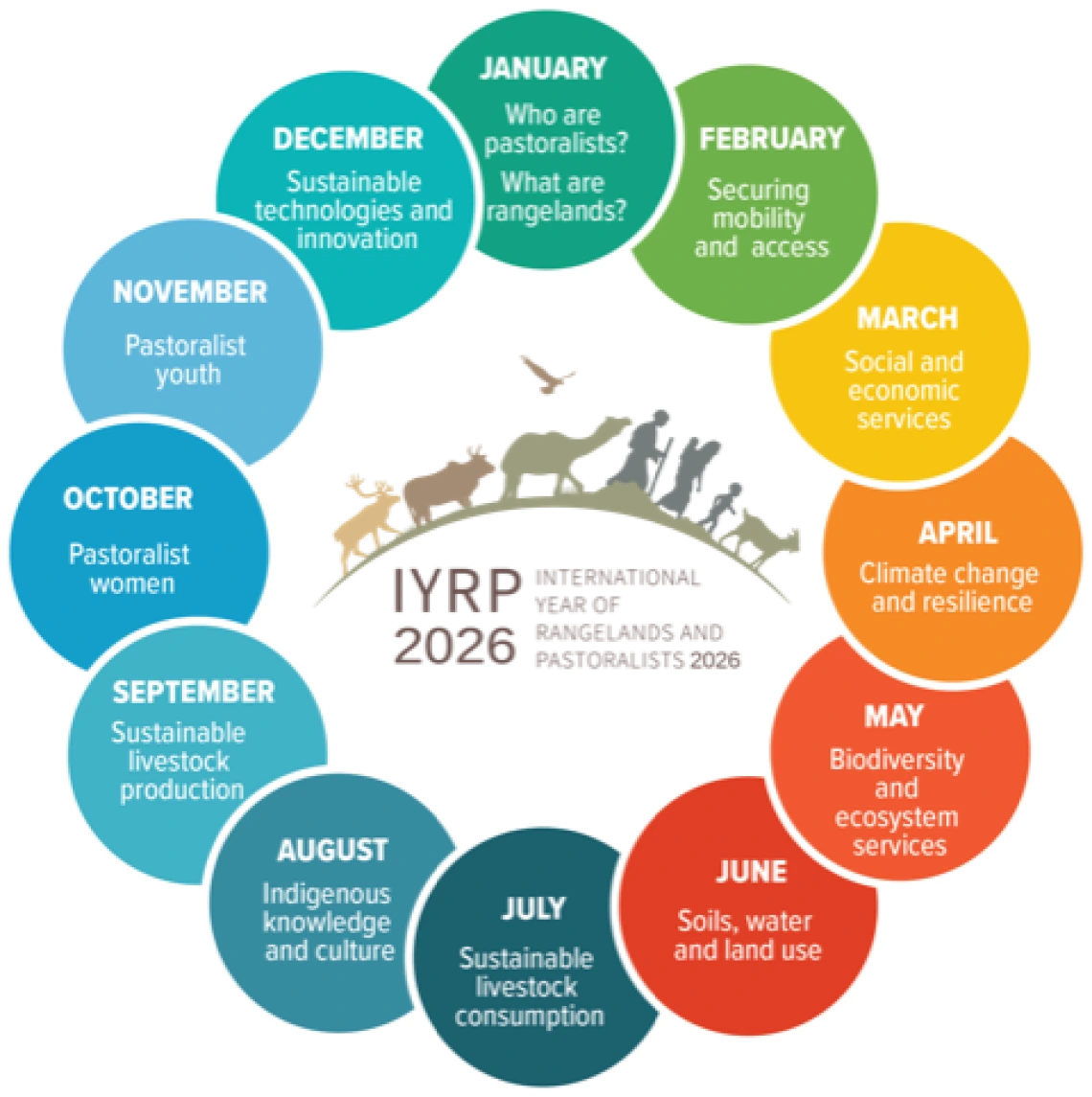
The ISG has proposed 12 global themes for the IYRP. This should help achieve, during the IYRP in 2026, the best possible worldwide awareness and recognition of the value and contributions of rangelands and pastoralists to global society and ecosystems – and lead to pro-rangeland and pro-pastoralist policies, legislation, and development and research initiatives. Each region is interpreting each theme in its own way. More information about the 12 themes can be found here.
IYRP Working Groups
Eight Working Groups have formed thus far to address some of these monthly themes:
- Biodiversity in Rangelands
- Climate Change & Dangers of Afforestation
- Gender & Pastoralism
- Land Degradation Neutrality (LDN)
- Pastoralist Economy
- Sustainable Mountain Development
- Water & Pastoralism
- Youth in the Rangelands
These Working Groups are involved in:
- Collating and analysing existing research results
- Identifying knowledge & information gaps – and new opportunities
- Stimulating and engaging in participatory research to fill gaps and explore opportunities
- Analysing existing international policy related to their themes
- Identifying “targets” (international bodies, events, etc.) for science- and experience-based advocacy
- Strategising on strong and impactful messages for these targets, including identification of spokespersons or “ambassadors” to bring them across
- Engaging with pastoralists and others in IYRP network (including other WGs) in disseminating these messages, also for public awareness.
More Working Groups will be formed as ISG members – and others who join the IYRP coalition – agree on themes to address jointly in preparation for the IYRP.
Some events and products of Working Groups and ISG in past year
- March 2023: “Global action for sustainable rangelands and pastoralism to achieve Land Degradation Neutrality” (science review)
- March 2023: “Rangeland afforestation is not a natural climate solution” (submitted for publication)
- February 2023: IYRP Symposium at Society for Range Management conference, Boise, Idaho
- December 2022: Film festival, photo exhibit and conference “Pastoralists, embracing uncertainty in a turbulent world” at European Commission’s International Partnerships InfoPoint, Brussels, together with PASTRES, VSFB and CELEP (Coalition of European Lobbies for Eastern African Pastoralism)
- November 2022: Session on “Pastoralism and rangelands restoration" at Food Systems Pavilion at UNFCCC COP27, together with SNV Netherlands, Environmental Defence Fund and CELEP
- November 2022: Virtual workshop on global initiative to strengthen Pastoralists’ Territories of Life, together with ICCA (Indigenous Peoples’ and Community-Conserved Areas and Territories) Consortium, Global Environment Facility Small Grants Programme and United Nations Development Programme
- October 2022: “Rangeland afforestation is not a viable climate change mitigation strategy: a contribution to the public consultation of the Integrity Council for Voluntary Carbon Markets (IC-VCM)”
- September 2022: Presentation on the role the IYRP could play in promoting sustainable forests and agrosilvopastoral systems in drylands at Global Landscapes Forum on “Transforming agrifood systems with forests”, together with FAO Committee on Forestry (COFO) Working Group
- September 2022: Launch of 2nd edition of “Perspectives on Pastoralism Film Festival” at Tropentag conference in Prague, Czech Republic, together with CELEP
- June 2022: Stockholm+50 side event: “Nature-based restoration and multipurpose use of rangelands: promising solutions to benefit our planet and people”
- June 2022: Webinar on pastoralist water rights & governance, together with Rural Water Supply Network (RWSN) and CELEP
For more information about these events and products, see www.iyrp.info/resources/news
Partnerships for the IYRP 2026
The IYRP ISG is working in partnership with numerous global organisations and related networks and initiatives, including:
- FAO Committee on Forestry (COFO) Working Group on Dryland Forests & Agrosilvopastoral Systems
- Global Agenda for Sustainable Livestock (GASL)
- Global Grasslands, Savannahs and Rangelands (GSR) Coalition
- Global Livestock Advocacy for Development (GLAD) / International Livestock Research Institute (ILRI)
- International Grassland Congress (IGC) 2023
- International Rangeland Congress (IRC) 2025
- International Year of Camelids (IYC) 2024
- IUCN/ILRI Sustainable investments for large-scale rangeland restoration (STELARR)
- Mountain Partnership Secretariat (MPS) at FAO
- Pastoralist Knowledge Hub (PKH) at FAO
- Sustainable Fibre Alliance working towards formation of Global Rangelands Stewardship Council
- UNCCD on Global Land Outlook (GLO) on rangelands & pastoralists
- World Alliance of Mobile Indigenous Peoples (WAMIP).
For more information about these, see www.iyrp.info/conventions-coalitions
To find out more about IYRP 2026, visit the IYRP Forum at IGC 2023 on Tuesday
16 May at 5:30 pm or go to www.iyrp.info or contact iyrp2026@gmail.com

